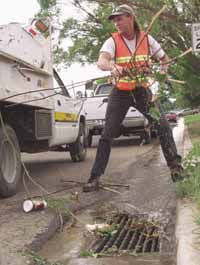| Price city employee Dennis Rogers cleans debris from a grate on the corner of 400 East and 400 South. Much of the trash in the grates is a result of citizens dumping grass clippings and other yard debris by the curb. The cities gutters are used to transport irrigation water to users and the practice of dumping compounds the problem that city crews face in keeping the water flowing to where it should go. |
Mayor Joe Piccolo is sending a letter to all Price city water users reminding residents that there are irrigation methods besides sprinklers and urging citizens to be considerate of the program.
“In the past, the Salt Lake Tribune’s civic beautification committee has presented Price city an award for its beautification,” points out Piccolo’s letter. “We, as a community, deserve this award. You, as residents, do an excellent job in keeping your yards and businesses well kept and attractive.”
The mayor’s letter requests neighborhood efforts in maintaining the city. In particular, irrigation and storm water flows.
Since the formation of Price, the Price-Wellington canal has provided irrigation water to farmers, explains city engineer Gary Sonntag. Depending on needs, water flows between May 1 and Oct. 1 through the city. Only the area below the canal, located at approximately 400 North, receives irrigation water.
Price has an agreement with the Price-Wellington board to maintain portions of the canal located within the city limits. This includes weed removal and some fencing.
There are 178 people in the city who have shares in the Price-Wellington Canal and can use the water to irrigate property.
According to Sonntag, there are at least 25 gates that deliver water through about 200 ditches that run off in various directions.
City budgets call for a full-time ditch master who is responsible for the maintenance of the gutters, ditches and water turns.
In addition, an administrative person manages the system. The employees are Jim Valdez and Brianna Welch.
Valdez’ job involves getting water into the gutters and ditches within the public right of way, including streets and alleys.
Users assume the responsibility to provide a means to take water from the gutters and ditches within the public right of ways and convey it to the points of use.
The water users break down into share owners or people renting or leasing shares, explains Welch. If residents own canal shares, users must provide certificates and the city will issue water turns on a first come, first serve basis, depending on the number of shares.
People with water shares pay a turn fee of $22 a year to the city.
Valdez, the ditch master, works with the program between May 1 and Oct. 1. He is responsible to keep the gates opened and closed.
Residents with shares who have paid turn fees have access to the water. The city supports wise water use, even with irrigation water.
Valdez’ job to monitor water is often made difficult because of problems he faces in maintaining the flows. Lately, there has been an increased accumulation of debris in gutters, ditches and grates.
Many people are putting grass clippings, tree branches and paper products as well as pop cans and cups in the gutters and ditches.
“Not only does this make the city look unpleasant, it wreaks havoc with the smooth flow of water by causing ditches, gutters and overshot driveway approaches to flood,” said Sonntag.
Price city crews often have to be called out on overtime to keep the areas clean, thus increasing the cost of maintenance, pointed out Sonntag. The program’s budget is based on a 40-hour work week.
But when employees get called out after hours, the situation results additional expenses for Price city.
Price’s priority is to keep water flowing. So when the city gets a call indicating that a grate is blocked or a ditch is flooding, no matter water time it is, crews can respond to clear up the problem.
Besides the obvious problems of keeping the water flowing, city crews also run into situations such as:
•Individuals who do not have shares attempting to use irrigation water.
•People taking water without paying a turn fee.
•Residents giving water away to neighbors and friends.
•Individuals taking water when it is not scheduled.
Another problem is when property owners are flooded because irrigation users do not control or maintain gates or ditches.
When the city attempts to resolve the problems, the individuals all too often become irritated and sometimes threatening. The matters are referred to the police.
According to Sonntag, Price officials are petitioning all irrigation users and citizens to work with the city in keeping the flow of irrigation water efficient so the program can continue.

